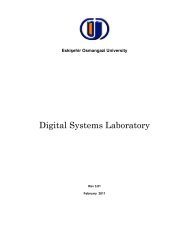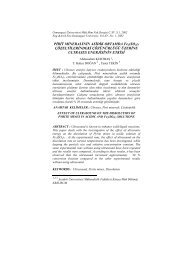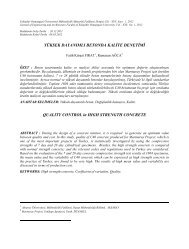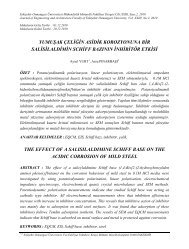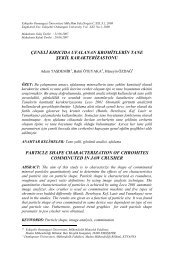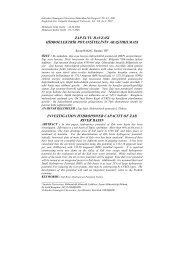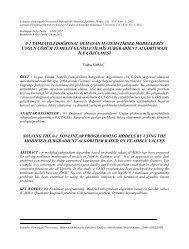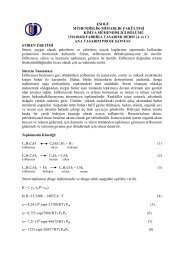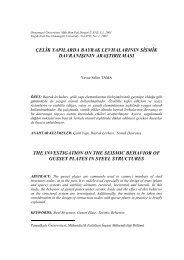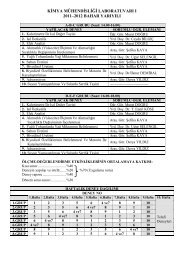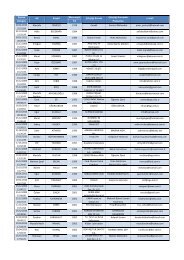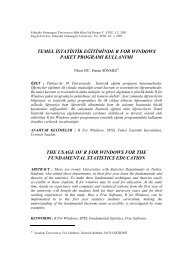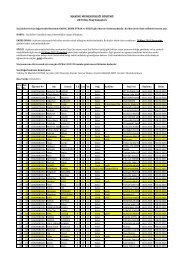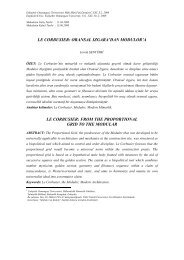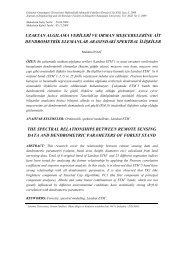Eskişehir Osmangazi Üniversitesi
Eskişehir Osmangazi Üniversitesi
Eskişehir Osmangazi Üniversitesi
You also want an ePaper? Increase the reach of your titles
YUMPU automatically turns print PDFs into web optimized ePapers that Google loves.
<strong>Eskişehir</strong> <strong>Osmangazi</strong> University Electrical-Electronics Engineering Department<br />
COURSE SYLLABUS<br />
WEEK TOPICS<br />
1 Introduction to electric power system<br />
2 Review of phasors, alternating current circuits and power calculations<br />
3 Balanced three-phase systems, power calculations, and advantages of three-phase system<br />
4 Power transformers<br />
5 Power transformers: three-phase transformer connections<br />
6 MID TERM EXAMINATION 1<br />
7 Transmission line parameter calculations<br />
8 Modeling and analysis of short and medium length transmission lines<br />
9 Transmission line differential equations and exact model<br />
10 Analysis of losses and lossy lines<br />
11 MID TERM EXAMINATION 1<br />
12 Maximum power flow and loadability<br />
13 Reactive compensation of transmission lines<br />
14 Symmetrical components<br />
15,16 FINAL EXAM<br />
NO PROGRAM OUTCOMES SUPPORT LEVEL<br />
1<br />
Adequate knowledge of mathematics, science and Electrical and Electronic Engineering; ability<br />
to practice theoretical and practical knowledge of these areas into modeling and solving<br />
4 High<br />
problems of Electrical and Electronic Engineering<br />
2<br />
Ability to identify complex engineering problems in Electrical and Electronic Engineering and<br />
related fields, for this purpose having skills to formulate, select and apply appropriate methods. 4 High<br />
3<br />
Having skills to apply modern design methods to design a complex system, equipment or<br />
product that should work under realistic conditions and constraints and satisfy specific<br />
4 High<br />
requirements concerning the Electrical and Electronic Engineering.<br />
4<br />
Having skills to develop, select and apply modern techniques and tools needed for Electrical<br />
and Electronic Engineering applications, skills to use information technology effectively.<br />
2 Less<br />
5<br />
Skills to design and conduct tests, collect data, analyze results, and interpret data for the<br />
experimental investigation of Electrical and Electronic Engineering problems<br />
1 None<br />
6<br />
Ability to function effectively as an individual and as a member of teams within the discipline<br />
and in multidiscipline areas.<br />
2 Less<br />
7 Communicating effectively in oral and written form both in Turkish and English. 1 None<br />
8<br />
Awareness of the necessity of lifelong learning, access to information, monitoring<br />
developments in science and technology and the ability to self-renewing<br />
3 Medium<br />
9 Understanding of professional and ethical responsibility 2 Less<br />
10<br />
Information on project management, change management and risk management practices,<br />
awareness on entrepreneurship, innovation and sustainable development.<br />
1 None<br />
11<br />
Information about universal and societal effects of engineering applications on health, safety<br />
and environment; awareness of the legal consequences of engineering solutions.<br />
1 None<br />
PREPARED BY SIGNATURE DATE<br />
Asst.Prof.Dr.BÜNYAMĠN TAMYÜREK 12/12/2012<br />
Go Back<br />
Ders Bilgi Formu 3/217<br />
151227457 POWER SYSTEMS ANALYSIS I



